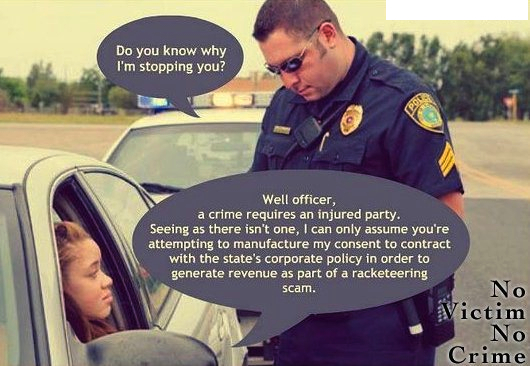First Published at the Tireless Agorist.
When it comes to the proper role of government, most people seem to agree on a few basic issues; murder, rape, fraud, theft and vandalism (acts of aggression against individuals and their property) are almost universally accepted as violations that government should prevent or punish. But conflicts tend to arise after we step beyond that common theme, and start attempting to make and enforce laws just for the sake of exercising dominion and control , and attempting to micromanage and stick government’s nose in every aspect of people’s lives.
Two legal terms help illustrate that fundamental split: malum in se and malum prohibitum.
Loosely translating from the Latin, malum in se means evil in itself, while malum prohibitummeans evil because of prohibition. The distinction between these two cases is discussed in State of Washington v. Thaddius X. Anderson.
Criminal offenses can be broken down into two general categories – malum in se and malum prohibitum. The distinction between malum in se and malum prohibitum offenses is best characterized as follows: a malum in se offense is “naturally evil as adjudged by the sense of a civilized community,” whereas a malum prohibitum offense is wrong only because a statute makes it so.
Malum in se offenses have a specific victim, while malum prohibitum offenses typically do not. Essentially, malum prohibitum translates as “because we say so,” we being whoever claims authority in that particular jurisdiction. Malum prohibitum covers not only “this you must not do” but also “this you must do,” as purportedly defined for “the good of society” by those in charge at that particular place and time.

The distinction between malum in se and malum prohibitum carves a clear and bright line across the legal landscape. This clear distinction is also found in discussion of the term rights, which are legal, social or ethical principles of freedom (negative rights) or entitlement (positive rights). Malum in se aligns closely with the principle of negative (or, historically, natural) rights, and stands in opposition to the principle of entitlement by virtue of membership in some group, generally called positive rights.
Malum in se defines acts that violate a person’s security in his person or property, and are therefore considered “naturally evil as adjudged by the sense of a civilized community.”
The Do-No-Harm, Non-Aggression Principle
The legal concept of malum in se finds its expression philosophically in the principle of do-no-harm, and non-aggression, which are themes repeated throughout history. The Bible’s golden rule, “Do unto others as you would have them do unto you” is one such expression, and most religions, including Buddhism, Hinduism, Islam, and Judaism express the same concept. Epicurus, in 300BC, declared “Natural justice is a symbol or expression of usefullness, to prevent one person from harming or being harmed by another,” and philosophers have echoed his sentiment through the ages. Thomas Jefferson expressed it succinctly in the Declaration of Independence, and more eloquently in other of his writings.
No man has a natural right to commit aggression on the equal rights of another, and this is all from which the laws ought to restrain him.

Herbert Spencer’s law of equal freedom states “Every man is free to do that which he wills, provided he infringes not the equal freedom of any other man,” while John Stuart Mill’s harm principle declares “the only purpose for which power can be rightfully exercised over any member of a civilized community, against his will, is to prevent harm to others.”
[Unfortunately, our laws have evolved well beyond those justified on the basis of malum in se to include a massive collection of malum prohibitum laws, making illegal a whole host of acts that are not inherently wrong or evil because of any reasonable harm to others, but whose only fault is that in the rapidly proliferating realm of overreaching government, and a growing desire to regulate and control everything from cradle to grave, they are labeled as wrong simply because they are, for whatever flimsy reason, deemed to be prohibited.]
Although most people practice the non-aggression principle in their daily lives, the fundamental non-aggression principle is at the core of every successful social interaction. People who violate the non-aggression principle are easily recognized and labeled as criminals.
The non-aggression principle is also found at the core of libertarian political philosophy. Indeed, to the best of my knowledge, the only political philosophy that holds the non-aggression principle as its central tenent is libertarianism [and self-governance].
Defining Evil
Evil is not hard to define. As we have seen from our exploration of malum in se and the non-aggression principle, evil is not relative; it must be judged from the viewpoint of the victim. Evil is taking from another their life, their liberty, or the product of their life and liberty, their property. This has long been the foundation of common law in all civilized societies. Indeed, it may well be considered the definition of a civilized society. Judged from the viewpoint of the victim, we see that equal treatment under the law is a necessary cornerstone of that civilized society, and unequal treatment under the law is simply legalized victimization.
Evil is not determined by a dictator, nor by the popular vote. Evil cannot be legislated out of existence. Two people may not decide it’s not evil to kill a third, or enslave him for their own benefit, or rob him of the product of his life and liberty. Nor may ten, or a million. Nor may those two, or ten, or million, appoint one among their number to kill or steal on their behalf, and wash their hands of the guilt. Pontius Pilate learned that lesson well.

Those who wear the mantle of authority may not rightly claim that what is evil for one is right for the many, or for the one who represents the many. Yet the leaders of the collectives we call church and state would have you believe otherwise. Their whole justification is based on selling you that twisted lie from the first day you learn the terms of authority, and obedience, and self-sacrifice.
A just society cannot be based on the concept that the one may be declared the legal victim of the many for any reason, be that the color of his skin, the tenents of his religion, or his success in the marketplace. If we, as individuals, profess to live in a just and civil society, we must live as individuals, without dictators, and without the desires of the many victimizing any single person [for a wide variety of acts that are not inherently wrong, but are only viewed to be wrong based on laws enacted specifically for that purpose.]
The Night Watchman State
The general concensus within civilized society in support of malum in se protection and the non-aggression principle suggests that a state that effectively protects its citizens from aggression, both from within and without, should find widespread support among its citizenry.
On the other hand, the current configuration of the modern state, with the assumption of unlimited power, its tendency to benefit the politically connected, resistance to criticism or change, lack of integrity, inability to accurately predict the outcome of its activities, tendency to repeat the same errors, economic malfeasance and outrightincompetence, incessantgrowth, marginalization or criminalizationofalternativeviewpoints, tendency toward secrecy, and willingness to project itself into any issue, combined with the impracticality of the citizenry maintaining tight control, has led to the perpetuation of a monstrous system [of malum prohibitum run completely amok], that pleases few and imperils everyone.
* * * * *
The next time you’re in a discussion about the proper role of government, bring the concepts of malum in se and malum prohibitum, negative rights and the non-aggression principle to the table. Speaking of the unspeakable often forces one’s opponent to face their own desire to game the system to produce outcomes that they may find favorable but that others may strongly oppose. [It will also force them to show their true colors in terms of their innate desire to exercise dominion and control over others].




Well written.
The facts stated make it pretty easy to see how the USA ends up with way more citizens in prisons vs any and all other countries on Earth.